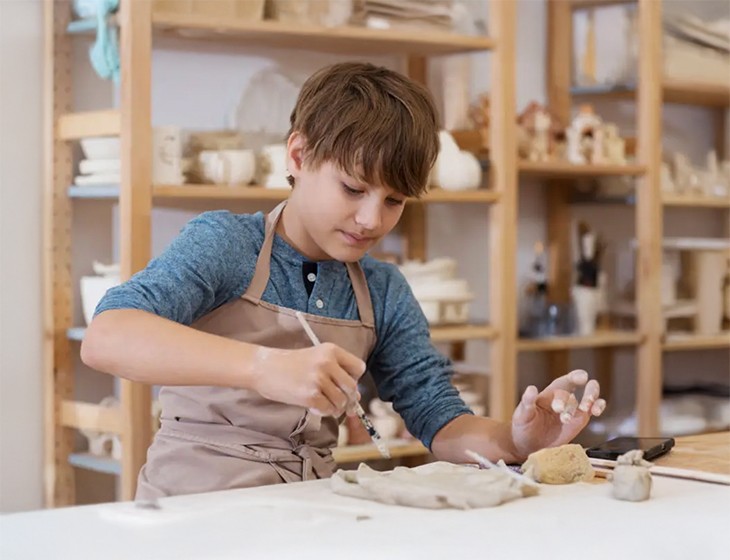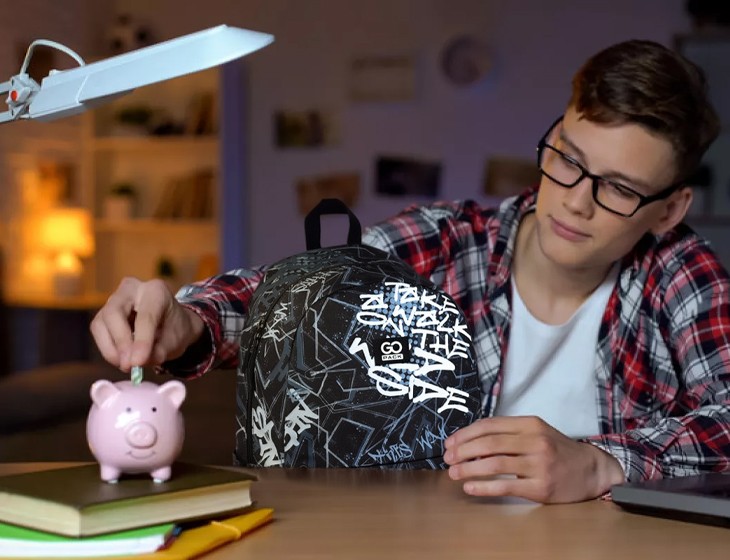Financial education for teenagers

Financial education is not magic or complex mathematics. It is simply understanding how and where to spend, save, and earn so that you have enough for your dreams, not just for coffee from the vending machine at school.

1. Budgeting skills are not just for adults
Here's the basic rule: money doesn't grow on trees. To avoid falling into the trap of ‘where did all my money go?’, you need to start budgeting. Don't be afraid of the word! It's like a shopping list, only for your wallet.
1. Write down everything you earn, even if it's just a hundred and fifty hryvnia for walking your neighbour's dog.
2. Then divide your budget into three categories:
- Essential expenses (e.g. school supplies or gifts for your mum on her birthday).
- Entertainment (cinema, coffee with friends, online subscriptions).
- Savings (for a big goal, like a cool new phone or an interesting trip).
By following this plan, you will soon see where you can cut back on expenses.

2. How to save money?
Saving money does not mean that you have to tighten your belt, live on a shoestring and count every penny. No, it means not spending on everything you want here and now. Here are a few tips:
- Start with small steps. For example, instead of buying your fifteenth pair of trendy socks, buy fewer and save money.
- Set a goal: ‘I want to save up for a new gadget.’ This will be your motivational driver.
- Use official banking apps to help you store and control your money.

3. First part-time job: how to earn money?
Your first part-time job can be as simple as helping your aunt clean the basement or taking old papers to be recycled. If you are 14-16 years old, this is a good start.
- Helping neighbours or acquaintances (e.g. walking dogs, helping around the house) is a great opportunity to gain your first experience of earning money.
- You can draw portraits, caricatures or sell handmade items online.
- Many brands are looking for young, ambitious people for various tasks: photo shoots, blogs or online surveys. This can also be your first step towards earning money.
- You can even see what your school offers for teenagers: internships, volunteer projects or events where you can earn money.
Yes, not everything will immediately translate into big money, but you will begin to understand how the world of earning works, and that is already a huge step forward.

4. Coin bank — not just for coins left over from the bus
- A physical money bank is ideal if you want to see your ‘mountain of coins’ grow. Put 50 hryvnia in there instead of buying a fifth juice — and you're already one step closer to your goal.
- Online piggy banks — most banking apps have functions such as ‘rounding up your balance’, ‘automatic transfers to a goal’ or ‘freezing an amount’ that you cannot spend immediately. It's like your financial filter.
A financial safety net is like a soft place to fall when something suddenly goes wrong: your phone breaks, your side job is cancelled, you need to buy a gift urgently. It's not about millions, but at least a few hundred hryvnia that you've set aside and don't touch unless absolutely necessary. At first, it may not be a whole cushion, but a mini-cushion — but it's yours. And over time, it will help you not to panic, but to act confidently. Don't be shy about starting small: 20-30 hryvnia a week is also a step towards financial stability.

5. Seasonal discounts and promotions — wait for interesting sales
Plan your purchases in advance. If you want a hoodie, wait for the off-season sale. If you dream of new trainers, catch a discount on them.
Life hack: make a list of the things you need. And when the promotions start, look for exactly those items, not everything in sight, just because they're cheap!

6. Put it in your basket, walk away, take a breath and think
Impulsive purchases are like funny memes: after three days, they're no longer interesting, and you regret spending the money.
Tip: if you really want something, add it to your online basket, wait a few days, and only then decide if you really need it. 50% of such purchases usually just fade away. Saving money is the magic of time!

7. ‘Small’ expenses: where does all your money go?
Crisps on the way to school, coffee after school, another bracelet from the kiosk... It seems like nothing serious, but at the end of the month, you're counting your tears instead of your money. Because all that's left in your wallet is pocket change.
You don't have to give up everything (because then you'll have a financial breakdown and spend your entire scholarship). Just calculate how much you spend on ‘small things’ in a week. The amount may surprise you. And maybe you should put some of it in a piggy bank!

8. Safety first: beware of information scammers
All these ‘earn 1000₴ in 5 minutes’, ‘invest in the future right now’, ‘subscribe to a mega course that will change your life’ offers look tempting, but more often than not, they are just hot air wrapped in pink sugar. It's important not to fall into the trap of ‘get rich quick’ schemes! The internet is full of offers: ‘Give us your money, and we'll give you even more.’ But remember that no offer promising instant wealth and investment can be safe.
- Do not pay for subscriptions you do not use.
- Do not click on suspicious links.
- Do not trust people who promise instant profits without effort.
- If something sounds like a fairy tale, it is most likely either a fairy tale, a financial trap, or another pyramid scheme.

9. Choosing a backpack is also an investment
Another important aspect of costs that is often overlooked is the backpack. It is not just an accessory, it is your constant companion at school, on walks, and during trips. And if you choose a no-name model, it may not last even six months. It's important to invest in a quality backpack because it will serve you for a long time.
Trendy and affordable GoPack backpacks are the perfect choice for thrifty teenagers who want to combine style and reliability. Not only do they look cool, but they also have enough space for everything you need, from books to gadgets. Such a backpack is not just a purchase, but a long-term investment in convenience and aesthetics that won't break your budget!
This is what the beginning of financial literacy for teenagers looks like. It's not just about money, but about the habits and responsibilities you will develop, which will become the foundation for your financial freedom in the future!

 UA
UA RU
RU